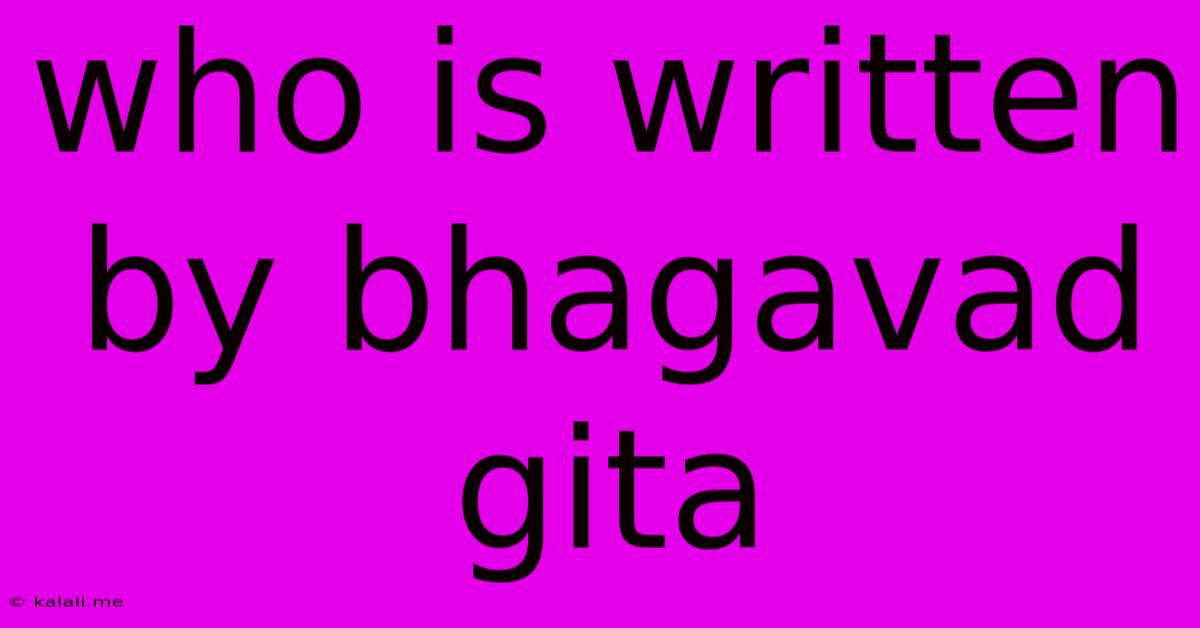Who Is Written By Bhagavad Gita
Kalali
Jun 13, 2025 · 3 min read

Table of Contents
Who Wrote the Bhagavad Gita? Unraveling the Mystery Behind the Timeless Text
The Bhagavad Gita, a cornerstone of Hindu philosophy and a revered text globally, has captivated readers for millennia with its profound wisdom and timeless message. But a question frequently arises: who actually wrote the Bhagavad Gita? The answer, unlike the text's clear and insightful verses, remains shrouded in some mystery, sparking scholarly debate and diverse interpretations. This article delves into the authorship question, exploring the historical context and different perspectives surrounding this iconic scripture.
The Bhagavad Gita isn't presented as a single author's work within its own narrative. Instead, it's woven into a larger epic poem, the Mahabharata. This makes pinpointing a single author challenging. While the Mahabharata itself is attributed to Vyasa, considered a mythical figure, attributing the Gita to him solely isn't universally accepted. The complex history and multiple layers of composition of the Mahabharata further complicate this. Many scholars believe the Gita evolved over time, with various additions and revisions across different periods.
Vyasa: The Traditional Attribution
The most common and traditional attribution points to Vyasa, a legendary sage credited with compiling the entire Mahabharata. Vyasa, often depicted as the author and organizer of this vast epic, is considered by many to be the ultimate source of the Bhagavad Gita as well. This view aligns with the Gita's seamless integration within the larger narrative of the Mahabharata. The traditional understanding emphasizes Vyasa's role as a compiler of existing knowledge and traditions, implying the Gita might be a synthesis of existing philosophical ideas rather than a single author's creation.
The Oral Tradition and Multiple Authors
However, the concept of a single author for the Gita is increasingly challenged by modern scholarship. The Mahabharata, including the Gita, likely emerged through an oral tradition that spanned centuries. Verses, stories, and philosophical discussions might have been added, refined, and passed down through generations of storytellers and scholars before being finally codified in written form. This suggests a collaborative authorship, with multiple contributors shaping the text over a long period. The layering of different philosophical schools of thought and styles within the Gita itself hints at this possibility.
The Evolution of the Text
The Gita’s evolution is likely tied to the development of different schools of Hindu philosophy, such as Samkhya and Yoga. These philosophical concepts are central to the Gita's teachings, indicating the text might have been influenced by, or even incorporated elements from, these different philosophical traditions. This further complicates the notion of a single author, pointing towards a more organic development shaped by various influences and contributions across different time periods.
The Importance of the Message, Not the Author
Ultimately, the question of "who wrote the Bhagavad Gita?" might be less important than the enduring wisdom it imparts. Its powerful message on dharma, karma, bhakti, and the path to liberation transcends the identity of its creators. The Gita's impact on Hindu philosophy, spiritual practice, and even beyond, makes its authorship a matter of scholarly debate, yet the profound impact of the text remains undeniable. Its timeless wisdom continues to resonate with readers seeking spiritual guidance and understanding. The true author may remain unknown, but the message itself speaks volumes.
Latest Posts
Latest Posts
-
Major Storage Form Of Carbohydrates In Animals
Jun 14, 2025
-
Which Cell Organelle Is The Site For Photosynthesis
Jun 14, 2025
-
All The Living Things In An Ecosystem Are Called
Jun 14, 2025
-
An Angle Whose Measure Is Exactly 90 Degrees
Jun 14, 2025
-
What Is The Mass Of 1 5 Moles Of Co2
Jun 14, 2025
Related Post
Thank you for visiting our website which covers about Who Is Written By Bhagavad Gita . We hope the information provided has been useful to you. Feel free to contact us if you have any questions or need further assistance. See you next time and don't miss to bookmark.